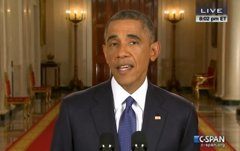Lyle Denniston, the National Constitution Center’s constitutional literacy adviser, looks at two totally different outcomes to challenges to new Obama immigration initiatives.
THE STATEMENT AT ISSUE:
“For almost twenty years, the use of deferred action programs has been a staple of immigration enforcement. The executive branch has previously implemented deferred action programs for certain limited categories of aliens, including certain victims of domestic abuse…, victims of human trafficking and certain other crimes, students affected by Hurricane Katrina, widows and widowers of U.S. citizens, and certain aliens brought to the United States as children. Programs similar to deferred action have been used extensively by the executive branch for an even longer period of time….Although the [new Obama] deferred action programs reflect a large class-based program, such breadth does not push the programs over the line from faithful execution of the law to the unconstitutional rewriting of the law.”
– Excerpt from a decision on December 23 by a federal judge in Washington, D.C., District Judge Beryl A. Howell, the first to reject a constitutional challenge to the new policies of the Obama Administration delaying deportation for more than four million undocumented immigrants living illegally in the U.S. Judge Howell’s comments in that decision conflict directly with a ruling a week earlier by a federal judge in Pittsburgh, who found the new policies to be unconstitutional.
WE CHECKED THE CONSTITUTION, AND…
It is a habit deeply embedded in the minds of most federal judges to avoid deciding constitutional issues before it is necessary to do so. It goes by the name “Ashwander doctrine,” after a famous opinion written by Supreme Court Justice Louis Brandeis in 1936 (Ashwander v. Tennessee Valley Authority). That hesitancy is even greater when a federal court is asked to referee a constitutional dispute between the other two branches of the national government – Congress and the presidency.
The doctrine, however, is not universally applied by federal judges, and from time to time a judge will reach out to make a constitutional declaration when doing so was not absolutely necessary to decide the case directly before the judge. That happened just recently, in the midst of the heated constitutional debate between the Republican leaders of Congress and the White House, over the new immigration initiatives now being implemented by President Obama and his Cabinet.
No doubt inevitably, challenges to the new Obama initiatives are getting into the courts, and that has already produced totally different outcomes – although the outcomes were both shaped by judges who said more about constitutional questions than they actually needed to say.
In one case (discussed in this space recently), a judge in Pittsburgh reached out to grasp the constitutional question in an individual alien’s potential deportation case, and proceeded to declare that President Obama acted beyond his legitimate powers. But the judge then went on to decide that case, strangely, on the premise that the policies may be constitutional, after all. That ruling deeply angered government officials, and, to them, it illustrated the error of deciding constitutional issues prematurely.
In the other new case, a different federal judge found that the federal courts had no authority to rule on an Arizona county sheriff’s claim that the immigration initiatives were invalid. The sheriff, the judge ruled, simply had no right to have his case decided because he could not show that he had been injured in any way by what President Obama had done. The lack of injury, the judge ruled, meant there was no live controversy within the power of a federal court to decide.
That judge could have stopped there, and perhaps should have. Once it is clear that there is no proper party before the court in a real case, it is over. But, yielding to temptation, this jurist went on to opine on why the Obama initiatives were entirely consistent with the way immigration policies have been enforced for a good many years. The judge conceded that those musings were not necessary to the case, but said that they were being offered anyway, to outline the obstacles that would have to be overcome if a proper case were to move ahead on the validity of the Obama approach to deportation policy.
Is there a value in having the occasional judge reach out to make constitutional statements when not truly necessary to decide a case? Or does it give the unfortunate impression that judges are being activists when they shouldn’t be?
The Pittsburgh judge’s remarks about the lack of presidential power, and the Washington, D.C., judge’s volunteered commentary on that subject, could help to clarify the lines or continuing constitutional combat over immigration policy, and thus could have an education function. The Pittsburgh judge did illustrate that the President’s policies may well be vulnerable constitutionally, while the Washington judge, in turn, showed that those policies may not be as novel as the challengers have argued, and thus may be constitutionally sound.
On balance, however, it may be a blow to the reputation of the federal judiciary as a detached tribunal each time a judge writes a constitutional essay, within the confines of an actual lawsuit, when that will have no actual effect on who wins or loses that particular case. The country very likely can wait to read such thoughts until they are vital ingredients of an actual decision that does settle something. Where constitutional judgments are to be made, a measure of judicial modesty is probably a good thing.
Recent Stories on Constitution Daily
Constitution Check: Is Obama’s new immigration policy constitutional, or not?
Top five Constitution Daily podcasts of 2014
Is Andrew Johnson the worst president in American history?
Appeals court ruling could put gun case on Supreme Court track
- Politics & Government
- Obama
Source Article from http://news.yahoo.com/constitution-check-obama-immigration-policy-constitutional-not-111607551.html
Constitution Check: Is Obama’s new immigration policy constitutional, or not?
http://news.yahoo.com/constitution-check-obama-immigration-policy-constitutional-not-111607551.html
http://news.search.yahoo.com/news/rss?p=immigration
immigration – Yahoo News Search Results
immigration – Yahoo News Search Results

